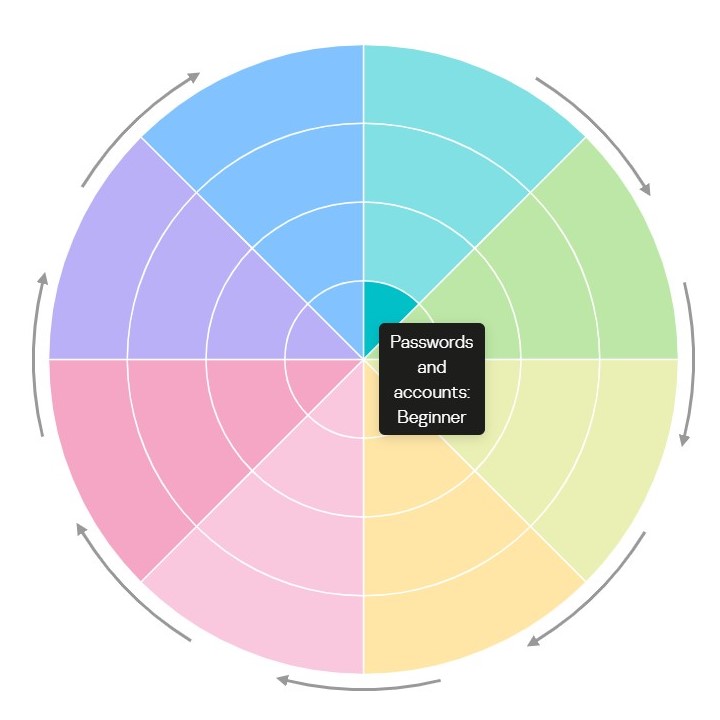Main Course
All training materials are grouped by topics. For each topic, you can choose the difficulty level (Beginner, Elementary, etc.). All the materials in a topic of a certain level of difficulty are called a training unit. To advance to the next level, users must complete all the training units of the previous level.
The following topics are available in the main course:
- Passwords and Accounts
- Web Browsing
- Social Networks & Messengers
- PC Security
- Mobile devices
- Confidential data
- Personal information
- GDPR
- Physical security of data
- Industrial Cybersecurity
- Bank card security and PCI DSS
- Artificial Intelligence and Neural Networks
A graphic representation of the training plan based on the topics and level of difficulty of materials is presented in the figure below.

Training plan scheme
Every training unit consists of the following stages presented in the image below.

Training unit stages
- Theory
These are slides with information that users study. The theoretical part may include questions that users must answer, but getting the right answers isn't reflected in the learning statistics.
In most cases, users need to complete between 6-11 lessons. Four days after completing the theoretical section, the platform emails the user with a summary of the topic to help reinforce the material.
Immediately after passing the theory part, the theoretical lessons in the next unit open.
Users can skip theoretical lessons and take the test immediately if the Early tests option is enabled in the company settings. If they don't pass the test, the user will have to complete the theoretical lessons and retake the test based on the training schedule.
- Test
Seven days after completing the theoretical portion, a test for this unit becomes available. This is a practical exercise where users are asked to answer questions on the topic. The test is considered passed if the percentage of correct answers is equal to or exceeds the test threshold level set in the group settings. If the test isn't passed, the training unit isn't considered complete. Users can only retake tests 3 days after an unsuccessful attempt.
- Simulated phishing attack
This step is only available if the Simulated phishing attacks setting is enabled in the company's training settings.
Ten days after completing the theoretical portion, an email is sent to the user that looks like a phishing attack, but doesn't do any harm to the corporate network. If the user follows what the email asks (for example, clicks the link), this means they didn't pass the simulation. In this case, the training unit isn't considered complete. If a user fails to spot a simulated attack, it will be repeated in three days.
A phishing attack is considered avoided if the user doesn't click any of the phishing email content within 3 days.
In addition to phishing attack simulations, you can create phishing campaigns based on ready-made templates to check your users' skills.
- Moving on to the next training unit
After completing all the training units, the user receives a certificate.
The training deadlines are determined by the training plan of each training group. The optimal time to master each topic is considered when determining the training schedule for a group. However, users can complete training materials faster if they want.
Units are developed with the "forgetting curve" in mind, which ensures maximum effective retention of the material. So, the knowledge test is administered 7 days after the conclusion of theoretical study, when the accumulated knowledge is transferred into long-term memory. The utilization of long-term memory in conjunction with repeated rote learning of the material results in optimal retention of skills and knowledge.
To the top